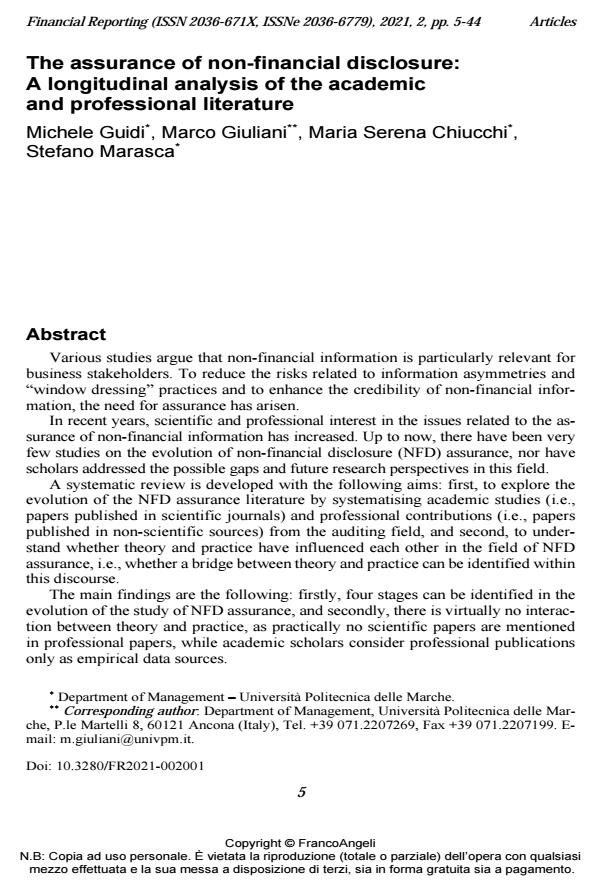The assurance of non-financial disclosure: A longitudinal analysis of the academic and professional literature
Titolo Rivista FINANCIAL REPORTING
Autori/Curatori Michele Guidi, Marco Giuliani, Maria Serena Chiucchi, Stefano Marasca
Anno di pubblicazione 2021 Fascicolo 2021/2
Lingua Inglese Numero pagine 40 P. 5-44 Dimensione file 763 KB
DOI 10.3280/FR2021-002001
Il DOI è il codice a barre della proprietà intellettuale: per saperne di più
clicca qui
Qui sotto puoi vedere in anteprima la prima pagina di questo articolo.
Se questo articolo ti interessa, lo puoi acquistare (e scaricare in formato pdf) seguendo le facili indicazioni per acquistare il download credit. Acquista Download Credits per scaricare questo Articolo in formato PDF

FrancoAngeli è membro della Publishers International Linking Association, Inc (PILA), associazione indipendente e non profit per facilitare (attraverso i servizi tecnologici implementati da CrossRef.org) l’accesso degli studiosi ai contenuti digitali nelle pubblicazioni professionali e scientifiche.
Various studies argue that non-financial information is particularly relevant for business stakeholders. To reduce the risks related to information asymmetries and "window dressing" practices and to enhance the credibility of non-financial information, the need for assurance has arisen. In recent years, scientific and professional interest in the issues related to the assurance of non-financial information has increased. Up to now, there have been very few studies on the evolution of non-financial disclosure (NFD) assurance, nor have scholars addressed the possible gaps and future research perspectives in this field. A systematic review is developed with the following aims: first, to explore the evolution of the NFD assurance literature by systematising academic studies (i.e., papers published in scientific journals) and professional contributions (i.e., papers published in non-scientific sources) from the auditing field, and second, to understand whether theory and practice have influenced each other in the field of NFD assurance, i.e., whether a bridge between theory and practice can be identified within this discourse. The main findings are the following: firstly, four stages can be identified in the evolution of the study of NFD assurance, and secondly, there is virtually no interaction between theory and practice, as practically no scientific papers are mentioned in professional papers, while academic scholars consider professional publications only as empirical data sources.
Parole chiave:non-financial information, assurance, sustainability, integrated reporting, influence, professional literature, literature review.
Jel codes:M42, M49, Q56
Michele Guidi, Marco Giuliani, Maria Serena Chiucchi, Stefano Marasca, The assurance of non-financial disclosure: A longitudinal analysis of the academic and professional literature in "FINANCIAL REPORTING" 2/2021, pp 5-44, DOI: 10.3280/FR2021-002001